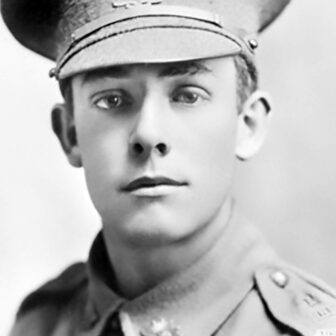Brent Cummings — “a white male pickup-driving ex-soldier living in a Georgia county where in 2016 Donald Trump received 71 per cent of the vote” — might not seem a sufficiently interesting protagonist for a biographical study. Stereotypes of race, gender, occupation and region pile up to create an expectation that he is one of Hillary Clinton’s deplorables. As author David Finkel puts it:
He’d been born in Mississippi in 1968 and lived there in his formative years, so obviously he was a racist. He’d been raised in New Jersey, where he played centre on his high school football team, and then went on to play rugby in college, so of course he was brutish and crude. He had spent twenty-eight years in the US Army and had been in combat, so surely he had killed people.
Obviously, of course and surely, Brent Cummings eludes these reductive inferences. In An American Dreamer, Finkel, a Pulitzer Prize–winning writer for the Washington Post, unfurls Brent’s inner complexities and outer contradictions.
Brent appeared fifteen years earlier as an army major in Finkel’s The Good Soldiers, an embedded account of the 2007 troop surge in Iraq, and Finkel’s long connection to him has built the foundation for a work of gripping intimacy. An American Dreamer gets inside Brent’s skull, and those of his wife Laura and neighbour Mike, to capture the emotional landscape of contemporary American life from three diverging vantage points.
Brent is now working stateside at a college with his retirement from the army looming. His soul is troubled. He feels his country has lost its way in the last couple of decades, as if he’s come “out of one war and into another” against enemies on the home front. In a revealing slip, he remarks that the earlier time “felt… clean. No that’s not the right word… It’s slipping.”
What the pollutant might be is not clear to him. Trumpism is part of it. Despite being “probably more Republican than Democrat, probably more conservative than liberal,” he loathes the man for his egotism, ill-discipline and bullying more than for his policies. But the problem runs deeper: Brent has lost confidence in his country’s goodness and shared purpose. “Everything was fraying. That’s what it felt like.”
Brent’s concerns have more to do with meaning than with material or political realities. His belief in American virtue and progress is shaken, and while that abstract dream is disintegrating a real one disturbs his sleep. Not the post-traumatic image of desert horrors we might expect but a chorus of mocking voices from a profound darkness.
His sense that the ground has shifted under him is reinforced by a series of bafflements. He is shocked by the lack of support he receives from colleagues when he challenges the use of a confederate flag on an insignia, upset by activist attacks on his beloved military, appalled by the unthinkable assault on the Capitol. He finds himself in a vanishing middle where the mental habits of a lifetime, grounded in ideas of honour and fair play, have lost their traction. “Am I the one who’s wrong? Am I the one who’s missing something?”
Laura and Mike play second and third fiddle to Brent, but Finkel gives voice to them with the same empathic immediacy. Laura’s main register is anxiety rather than disorientation. She fears violent crime, feels a rising sense of menace in her neighbourhood and worries about the fate of her intellectually disabled daughter when she is no longer around.
Mike, for his part, overlays fear with anger, going full-bore MAGA while railing against the “socialist and communist” treachery of the Democrats. Why Mike, a quadriplegic of modest means, would set aside his early doubts about Trump and come to see him as his infallible saviour is a mystery. His political conversion creates tension with his neighbours, a microcosm of the severing of connections that has played out across the country.
Finkel is a wonderful guide to the inner terrain of his characters. He shows rather than tells, keeping their dialogue and the private thoughts behind it direct and relatable. Brent in particular is brought to vivid life through confrontations with events that confound him. Very occasionally these episodes seem a little forced, notably in the parallels between an encounter with the security wall on a visit to Jerusalem and Trump’s border wall. Mike’s characterisation can also appear ever so slightly two-dimensional by comparison with Brent’s, but the book as a whole is a triumph of compassionate and sympathetic attention.
Finkel inhabits Brent in a rare way, better than a life-long friend could hope to do. More a finely tuned recording instrument than a buddy, he makes no attempt to elevate Brent, hide his flaws or turn him into a morally instructive Everyman. He is an ordinary guy, standing somewhere on the slippery hump of the political bell curve, but he is also a creature of a specific time, place and tradition, not just a symbol of averageness. Witnessing his puzzlement at how things have changed, we might wonder how much his sense of loss comes from occupying a political centre that cannot hold and how much it is a sign that he is getting older and his generation is being unseated.
We hear so much about the growing polarisation of American life. Books like this one help to humanise the conflict, not only by plucking individuals from their political tribes but also by exploring the quieter emotional dimensions of their experience. Beyond the primal fears and hatreds, Finkel suggests, there are people seeking solutions to big, existential questions about purpose, meaning, legacy and value. An American Dream shows us that behind all the yelling and distrust and there is vulnerability and hope. •
An American Dreamer: Life in a Divided Country
By David Finkel | Scribe | $36.99 | 256 pages




